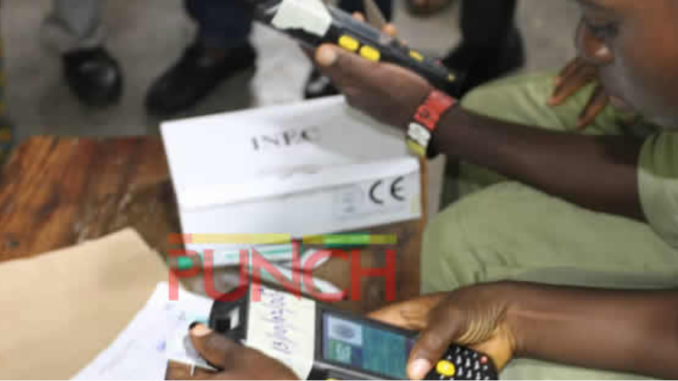
Now that the Ekiti State governorship election is over and all cast votes have been counted, I pray for peace, prosperity and progress of the state. I do not by any stretch of will or innate desire wish that any calamity should befall my state. Ekiti is where I have so far lived for nearly 20 years. It is where I have earned my bread and where I have consistently paid my income tax, without a single breach, for more than 18 years. Therefore, although others far away in their comfort zones may wish the worst for Ekiti, I reject their wish (by fire) and counter it with a prayer of peace and prosperity. I have no other option or any desire but to do this.
Four years ago, when he ran against the incumbent governor, Ayo Fayose, and lost, the present Governor-elect, Kayode Fayemi, accused the former of having bought the electorate cheaply with a few grains of rice. His accusation gave rise to the catch-phrase, Stomach Infrastructure. Today, with the result announced, and based on what obtained before and during the election, it is quite evident that the governor-elect learned not a few lessons which motivated his perfection of the system and getting the electorate carried along by “the rules of the game”. As it is, Fayemi has clearly demonstrated that he has learned the ropes and has been able to conquer with an arsenal more lethal and effective than Fayose’s few cups of rice.
The present election, in more ways like that which took place four years ago, was, by local standards, quite free and fair. Other people from far or near climes may hold a different view, but if election in Nigeria is, as posited by no less a person than a former sitting president, “a do-or-die affair”, it follows that it is war. And, if election is war, it then follows that what obtained in Ekiti was very fair. Is it not said that “in war, everything is fair”? There may have been pockets of negligible skirmishes; at least, at Temidire polling unit which is not far from where I cast my vote, there was an issue of attempted ballot snatching. A winner truly emerged based on the number of valid votes cast and counted.
It would amount to a barefaced super hyperbole for anyone to say that all eligible electorate in Ekiti participated directly in the electoral process that gave rise to the emergence of the current governor-elect. Truly, not everyone who had the PVC voted. The total number of votes cast, 403,451 is quite far below the total number of registered voters, 909, 585. Nevertheless, it would amount to a lack of understanding to hold that those who participated in the election do not represent the majority or entirety of the state. Thus, a greater majority certainly had a firsthand apprehension of what transpired on the day of the election. In other words, we, Ekiti, came, we saw and we know what happened. “What happened?” This was the question a friend of mine asked in an unveiled derision and gloating. I simply answered and said, I know the Federal Government has a clear mandate to fight corruption. Ekiti, by the result of this election, is fully aligned with the government at the centre and therefore would never be in the dark as to what it meant to “fight corruption”. No single Ekiti electorate shall henceforth claim ignorance of what corruption or the fight against it meant. I did not know whether my response was apt enough to deliver the appropriate message to a gloating friend with whom I witnessed what obtained at the polls in Ekiti.
At Ikere, where one of the major contenders hails from, the price for a print of the thumb was as high as N20,000 in some highly competitive quarters. At Ado, it was less and in the neighbourhood of N10,000 and N12,000. Where I voted, an idyllic suburb of Ikole metropolis with a substantial presence of a settler farming clan from Kogi State, the rate was a flat N5,000. You thumbprint and you are paid without bargains! And trust the peasant farmers, the five thousand grand from the highest bidder was more attractive than the contending party’s proposal of “thumbprint and be promised” (N3,000 after the election because they ran out of cash while trying to compete) as if they knew they were going to lose the election.
In all this, it might be easy to miss out the point with respect to who the true winners and losers are. The people are the winner if we must factor in the quite significant reality that they are now wiser than they used to be in matters pertaining to “the fight against corruption”. Every Ekiti electorate needs not be told what “fighting corruption” meant because they are firsthand witnesses to the process which would usher in the man who would have the programme domiciled in their state. It is a win-win situation for the people and the elected. The elected won his mandate but the people are never the losers, after all, every voter got richer by N5,000 or N20,000. Now that it is possible to transfer or switch voting points, with adequate permutations, a shrewd electorate should hazard a guess as to how best to make more money through their choice of voting points. Conversely, the nation is the loser. The nation, Nigeria that is, is the loser because her leadership has once again failed her. The nation has been failed because her leadership has chosen rather to perpetuate the practice of perfidy in relation to elections. This failure would, no doubt, affect all other facets of the socio-economic life of the people.
In Ekiti, the politicians came, they promised and they paid! The people, they watched, they played by the rules and they know! God save Nigeria, Our Dear fatherland!
Mazi Iroegbu, a scholar, is resident at Ikole-Ekiti, Ekiti State
END

Be the first to comment